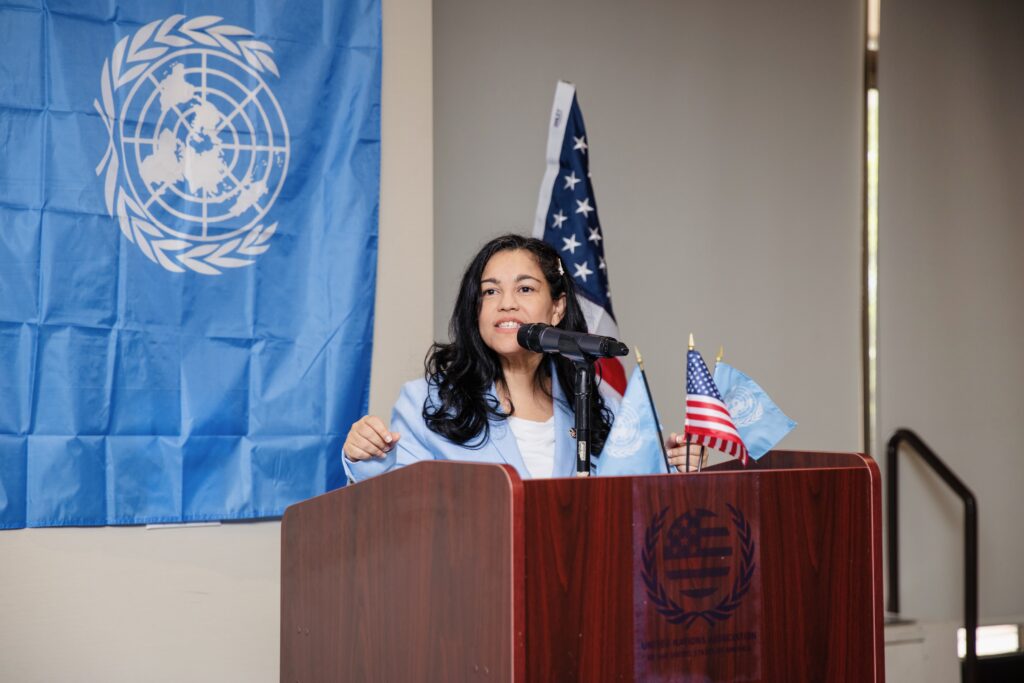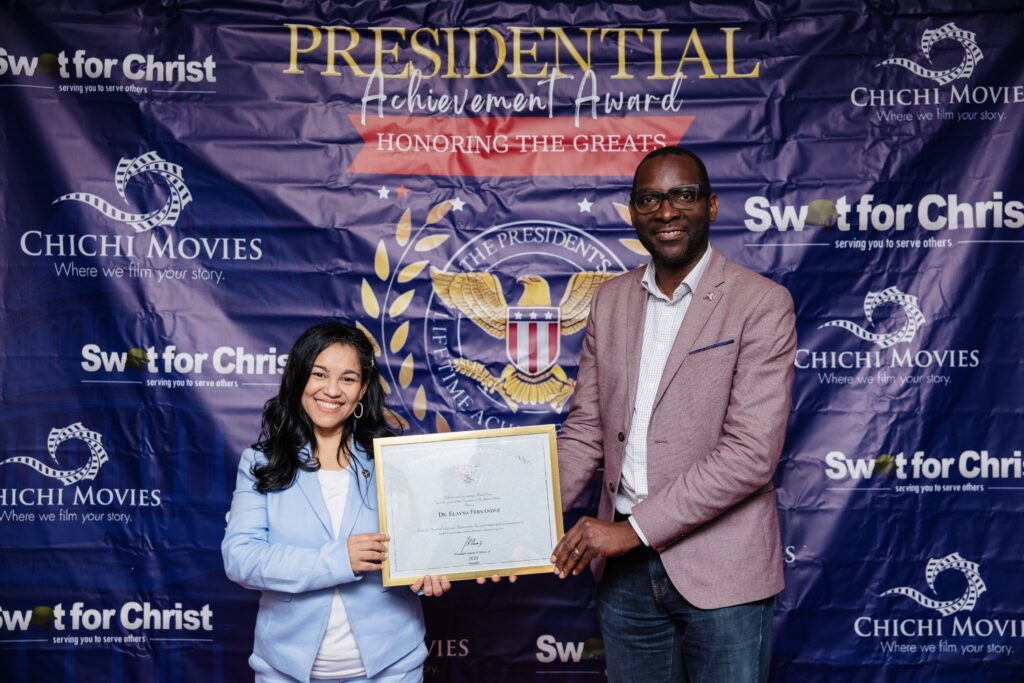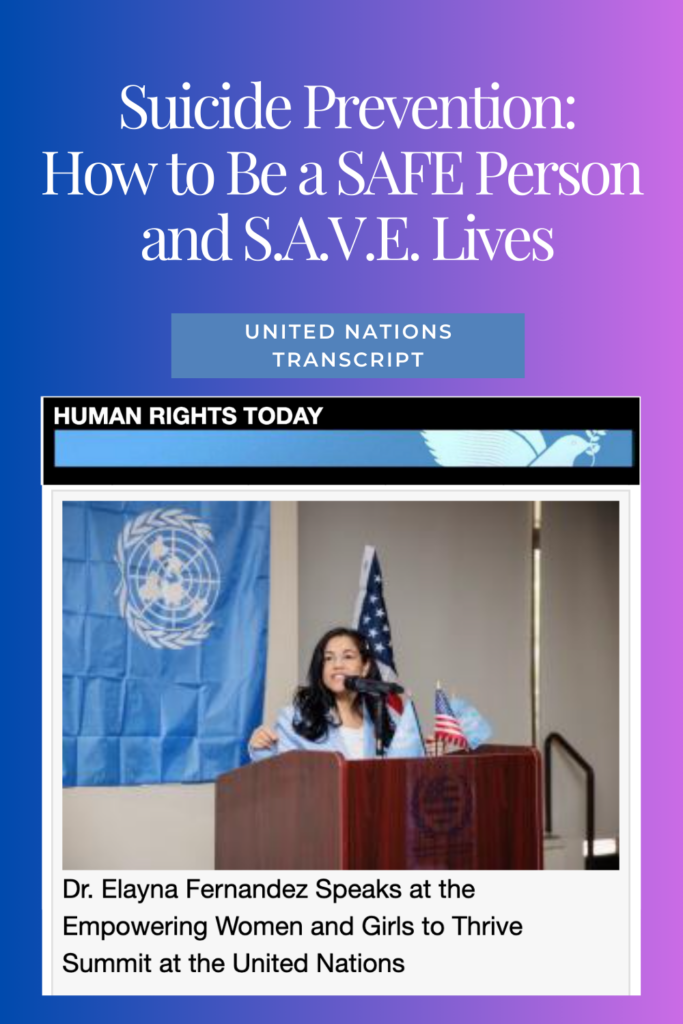I recently shared one of my most vulnerable stories at the Empowering Women and Girls to Thrive Summit at the United Nations about suicide prevention, to help end the stigma of suicidal thoughts and promote more loving compassion and acceptance.
This transformational event was supporting Sustainable Developmental Goal #5: “to achieve gender equality and empower all women and girls.”
The event intentionally featured women speakers from different walks of life, representing diverse backgrounds, ethnicities, ages, and abilities, with the common purpose of offering solutions to global issues women and girls face.
I worked as a speaker coach and story strategist with each speaker at this summit, guiding them to focus on the transformation they wished to inspire and ignite in the audience.
Each speaker used my S.T.O.R.Y. System for Transformational Storytelling, an inspired technique I’ve been using for almost two decades in my own storytelling and my speaker and author coaching programs, and that I teach at conferences, corporations, and organizations that want to make a difference and create meaningful change.

Ben Dotsei Malor, Chief Editor at the UN News, addressed us as a guest of honor, and attendees came from several states in the United States and different countries, including Panama, Nigeria, Ghana, England, and Canada.
As an immigrant and naturalized citizen of the United States, it was humbling to be honored with The Presidential Lifetime Achievement Award, accompanied by an official letter from the office of The President of the United States, a certificate, pin, and medallion.

I am so grateful to be recognized for my efforts in fulfilling my mission to help leaders harness the power of storytelling to empower others to break cycles, find peace, and feel whole — at homes, workplaces, and the world. Storytelling plays an integral part in suicide prevention.
After the event, all the speakers and the President’s Volunteer Service Award honorees were featured on a billboard in Times Square.
Now I’m going to share the transcript of my United Nations speech about suicide prevention with you. My talk was designed to help anyone who has struggled or is currently struggling with suicidal thoughts, just like I have.
Suicide is everyone’s problem and we can all engage in prevention efforts by learning to become a SAFE person to so many of those around us who are suffering in silence.
My United Nations Speech Transcript
I’m done.
I can’t do this anymore.
This is just too much.
What’s the point?
Everyone’s better off without me.
I’m better off dead.
I was lying in bed sleepless, looking up at the rusted tin ceiling, when these thoughts showed up uninvited. I was only 5 years old. And they’ve never left me – always insisting that I am a living mistake making mistakes.
Eventually, those thoughts became active, when I started to look around and fantasize about creative ways that would get the job done.
The first time I acted on those thoughts, I was 13.
Lying in the hospital room, the first person I saw when I came back to consciousness said to me:
“Oh you’re alive…you can’t even do that right.”
Now, I know here at the United Nations, I’m surrounded by people who aim to empower others to thrive. You’re probably thinking – I would never say such hurtful words to someone who is in so much pain.
I believe you.
And yet … Most people don’t know what to say… so they’d rather not talk about it…
For example, when I tell others I am a cancer survivor, their faces light up. They ask follow-up questions and almost jump for joy.
In contrast, when I share I am a multiple-time suicide survivor, there’s shock … and silence… followed up by a change of subject.
Or they use default – and lethal- phrases like:
- Don’t give up
- It will get better
- Or something along the lines of “be grateful,” “count your blessings,” “choose joy,” or “look at the brighter side of life…”
What I’ve realized through living over 4 decades with both passive and active suicidal thoughts as my most loyal companions is that positivity is fuel to the stigma of suicidality.
It makes us wrong for something that is not our fault and because what others recommend or prescribe doesn’t work for us, it reinforces the feeling that we are broken and that we are alone.
Feeling unable to “positively think it or pray it away” adds to our sense of defeat.
That’s why – for years- I lived trapped in my shame-induced solitary confinement,– sometimes obsessively looking for a cure, sometimes desperately looking for a weapon.
Suicide is the second leading cause of death for children, adolescents, and young adults worldwide. It’s urgent, it’s common, it could happen to anyone – it’s a global human issue- and it’s everyone’s problem…
One person dies by suicide every 40 seconds – and many suicides are preventable.
Because evidence proves that trauma does not come from experiencing adversity, but from feeling alone in our hurt.
In my research, I’ve confirmed what I learned in my lived experiences: The way we talk about suicide makes it difficult to reach out for help.
The words we use matter. And choosing respectful language around suicide helps us become safe people.
Repeat after me: SAFE people SAVE people.
By learning to be a safe person, we can remove the stigma around suicidal thoughts, decrease the suicide rate, and help people stay alive, because they no longer feel like they have to suffer in secret.
I’m sharing 3 easy guidelines to decriminalize and destigmatize the word suicide and the experience of suicide:
- Let’s avoid the word commit. We are not criminals or sinners – we’re lonely, afraid, and feeling like suicide is the most viable solution to seemingly unsolvable problems and unbearable pain.
- Let’s ban the word attempt: Staying alive is not a failure, and let’s not ever imply that suicide is a success.
- Let’s stop talking about taking a life or killing oneself: the insinuations that we’re not thinking of others or that we don’t value our lives are ignorant, inaccurate, and even insensitive.
Some helpful alternatives can be:
- death by suicide
- suicide contemplation
- and seeking to end one’s pain.
As a speaker, advocate, and author, I encourage people to use my acronym SAVE to avoid poisonous positivity when someone shares their pain:
S– Stay calm
A– Attentively listen
V– Validate their experience
E– Express gratitude for their vulnerability
You don’t have to be a mental health expert to make a difference. Holding space alone can be life-saving. You can be with someone through their proverbial bridge until professional help comes. Saying the right words can help them seek and access the right tools, resources, and safety plans.
My invitation to you is: Next time some shares they are going through a hard time, don’t be positive, be present.
Make sure they get a loud blaring message from you: “Your pain is valid, and it matters to me. You are not alone.” This saves lives – because SAFE people SAVE people.
And to those who, like me, face these thoughts one day at a time, I share my firm witness … it’s okay to dance with death, just make sure you take the lead. Blessings!
Comments from the Audience at the United Nations
I was so moved by the comments I received from the audience while speaking at the event and after.
Here are some that stood out to me and that were published on outlets like ABC, NBC, CBS, FOX, the CW, and Human Rights Today, as well as other prominent international news outlets across Asia, Africa, and Latin America, including my beloved homeland, the Dominican Republic:
“I was hospitalized once due to suicidal ideation and harmful behavior 17 years ago and I am deeply into the message Dr. Fernández conveyed today. Very powerful words.”
“Dr. Elayna’s speech was about a tough subject facing so many members of society. Her personal experience was shared with vulnerable honesty.”
“Elayna offers powerful advice on dealing with those contemplating suicide. Powerful!”
“WOW! I’m grateful to Dr. Elayna for helping people learn how to support people who are struggling. I love that she shared simple guidelines to de-stigmatize suicide. Sage words!!!”
“Dr. Fernández’s talk made me feel so much sadness and also so much hope. I have several friends and family members who struggle with suicidal thoughts and her talk helped me see that there are ways I can help them without causing more pain which I was afraid of doing. Her talk gave easy tips and things to do to help our loved ones feel supported during these scary times.”
“Her speech made me feel seen and understood. Addressing the ways we can help those struggling with these thoughts through Elayna’s suggestions could be life-changing. Unforgettable!”
“Dr. Elayna Fernández is a victorious woman championing the way for people to understand stigmas connected with suicide, gives people permission to no longer suffer in silence, and teaches us how to be a safe and supporting person. She is a living example for us all.”
“Dr. Elayna Fernandez’s speech was not only inspiring but also deeply informative. Through her guidance on the correct methods of assisting others, she empowered us to become SAFE individuals and actively work towards saving lives.”
“Elayna’s talk stopped me in my tracks and made me reflect deeply on a past conversation with a friend who needed a safe person to confide in. With the best of intentions, I realized I wasn’t equipped to be that person then, but now I can and will be. Elayna teaches us how to become that safe person, empowering us to help those grappling with suicidal thoughts. Elayna’s message is a vital call to action, showing us how we can truly make a difference in someone’s life.”
“Elayna has the unique ability to reach people’s souls while delivering practical tips to change their lives. Affirming those of us who suffer the malady of suicidal thinking is critical in the world today to let us know we’re not alone.”
“Dr. Elayna’s heartfelt topic moved me to tears. I felt informed, convicted, and empowered to be the SAFE person she talks about. Sadly, suicide is a global problem and we cannot afford to remain uninformed.”
“Her statements are eye-opening and her talk teaches us how to help people who are hurting. They are everywhere and may be closer than you think.”
“Dr. Elayna Fernandez’s powerful speech on suicide prevention not only highlighted the importance of being a SAFE person but also inspired us to take action and potentially save lives.”
“I appreciate her vulnerability and openness to address the often overlooked and stigmatized issue of suicide. She educates her audience on how to be a safe person and provides guidelines for supportive communication, highlighting how we can all play a role in preventing suicide and supporting those who are struggling.”
I am deeply grateful for the opportunity to bring hope to people all over the world through my books, talks, and training programs, and to support those who want to do the same in becoming transformational storytellers.
What resonated most with you about my talk? To view the rest of the talks, visit the Transformational Storytellers channel on YouTube, and to take the first step in becoming a Transformational Storyteller, visit TransformationalStorytellers.com
Founder of the Positive MOM® and creator of the S.T.O.R.Y. System: a blueprint to craft and share powerful stories that will transform your results and help others do the same. Dr. Elayna Fernández is a single mom of 4, an award-winning Storyteller, Story Strategist, and Student of Pain. She’s a bestselling author, internationally acclaimed keynote speaker, and 5x TEDx speaker. She has spoken at the United Nations, received the President’s Volunteer Lifetime Achievement Award, and was selected as one of the Top Impactful Leaders and a Woman of Influence by SUCCESS Magazine. Connect with Elayna at thepositivemom.com/ef and follow @thepositivemom. To receive a gift from Elayna, click HERE.

Want to support the Positive MOM blog?
The mission of the Positive MOM blog is to help moms break trauma cycles, find peace, and feel emotionally whole, so they can practice supportive parenting and create a positive and healthy environment for their children. If you found Elayna’s content valuable, please consider donating a love offering to enable her to keep creating content and helping more moms worldwide. Donate HERE.

